Former United States President Donald Trump faces his third criminal indictment in four months, this time stemming from a federal investigation into his alleged attempts to interfere with the results of the 2020 election.
The 45-page indictment was filed in Washington, DC, by Special Counsel Jack Smith, who has led investigations into the former president on behalf of the US Department of Justice.
The former president has been accused of attempting to overturn his loss to Democrat Joe Biden in the 2020 race.
“Despite having lost, the Defendant was determined to remain in power,” the indictment reads.
“So for more than two months following election day on November 3, 2020, the Defendant spread lies that there had been outcome-determinative fraud in the election and that he had actually won.”
While the indictment affirms Trump’s right to free speech, it claims the former president “pursued unlawful means of discounting legitimate votes and subverting the election results”.
Tuesday’s charges include one count of conspiracy to defraud the US, one count of conspiracy against rights, one count of conspiracy to obstruct an official proceeding, and one count of obstructing an official proceeding.
The former president has been summoned to appear before a federal district court on August 3. Six unnamed co-conspirators were also included in the indictment, one of whom is believed to be Rudy Giuliani, who served on Trump’s legal team.
“Our investigation of other individuals continues,” Smith said on Tuesday. “In this case, my office will seek a speedy trial, so that our evidence can be tested in court and judged by a jury of citizens.”
US District Judge Tanya Chutkan has been randomly selected to oversee the case.
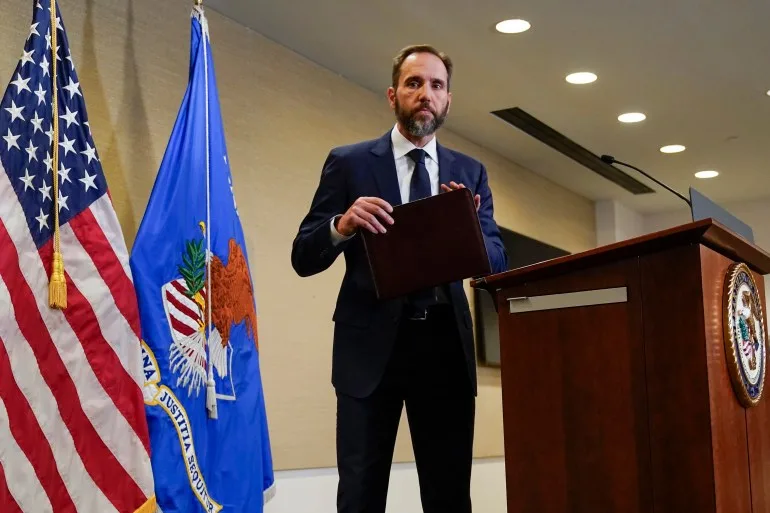
January 6 riot a centrepiece of indictment
The indictment specifically cites the events of January 6, 2021, which saw Trump supporters storm the US Capitol in a deadly attempt to disrupt the certification of the election results.
“The attack on our nation’s capital on January 6, 2021, was an unprecedented assault on the seat of American democracy,” Smith said in a brief media appearance, approximately three minutes long.
“As described in the indictment, it was fuelled by lies, lies by the defendant targeted at obstructing a bedrock function of the US government: the nation’s process of collecting, counting and certifying the results of the presidential election.”
In tracing the lead-up to the January 6 attack, the indictment describes multiple calls Trump placed to then-Vice President Mike Pence, including one on Christmas Day.
“The Defendant quickly turned the conversation to January 6 and his request that the Vice President reject electoral votes that day,” prosecutors said of that incident.
Pence allegedly reiterated he had no power to subvert the will of the voters: “You know I don’t think I have the authority to change the outcome.” Pence was slated to oversee the counting of Electoral College votes on January 6.
But the indictment accuses Trump of persisting in pressuring Pence. It also claims he knowingly setting the false expectation that the vice president could reject the Electoral College votes, helping to spark the Capitol riot, in which some protesters could be heard chanting, “Hang Mike Pence.”
“The Defendant’s knowingly false statements were integral to his criminal plans,” the indictment said.
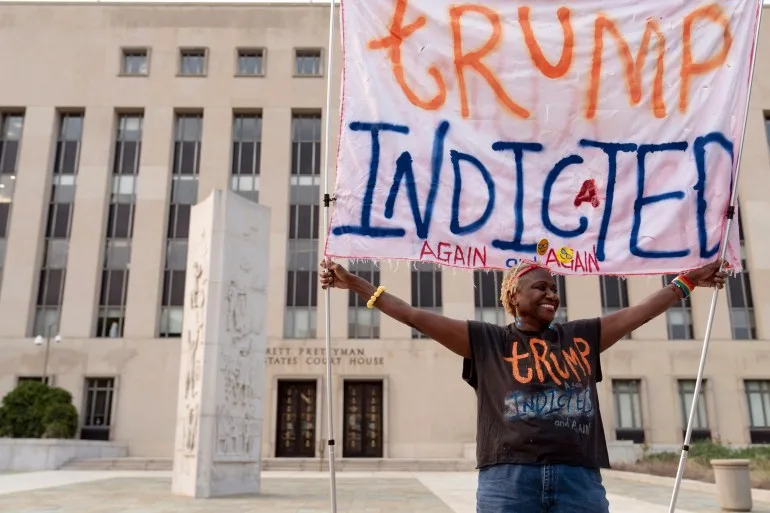
False electors and pressure campaigns
But the indictment offers a broader picture, beyond the Capitol riot, of attempts Trump allegedly made to subvert the election. It includes a state-by-state look at campaigns to pressure election officials, particularly in key swing states, to reverse Biden’s victory.
In one instance, prosecutors write that “the Defendant publicly maligned a Philadelphia City Commissioner for stating on the news that there was no evidence of widespread fraud”.
As a result, the indictment explained, “the Philadelphia City Commissioner and his family received death threats”.
The indictment also points to instances where, for example, Trump accused 30,000 non-citizens of voting in Arizona and more 10,000 dead voters of casting ballots in Georgia, despite being told explicitly that these allegations were false.
“As the Defendant’s attempts to obstruct the electoral vote through deceit of state officials met with repeated failure”, the indictment alleges Trump and his co-conspirators “developed a new plan”: to organise “fraudulent slates of electors”.
Each state has a given number of Electoral College votes assigned it, and electors are chosen to cast them, in a largely symbolic role. Electors then sign the Electoral College certificates that are then sent to Congress to count for a final certification of the election’s winner.
Most states have a “winner-takes-all” system: If a candidate wins the popular vote, they receive all of the state’s Electoral College votes.
According to the indictment, Trump zeroed in on seven battleground states that awarded their Electoral College votes to Biden: Arizona, Georgia, Michigan, Nevada, New Mexico, Pennsylvania and Wisconsin.
By appointing “fake electors” in those states, Trump allegedly hoped to “create a fake controversy at the certification proceeding” on January 6, sabotaging Biden’s victory.
Some of those electors “were tricked into participating” on the premise that their fraudulent votes would only be used if Trump was successful in proving his victory, the indictment added.
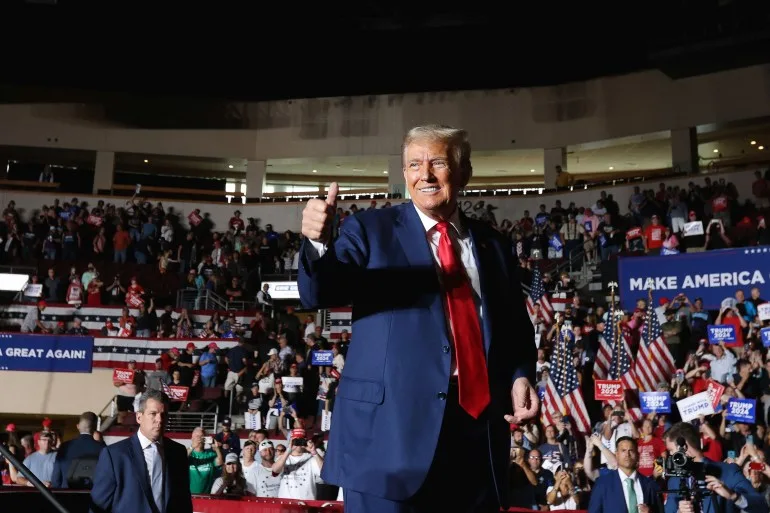
Trump responds on social media
Trump — a Republican frontrunner in the 2024 presidential race — teased the news earlier in the day on his Truth Social platform, as he has with earlier indictments.
“I hear that Deranged Jack Smith, in order to interfere with the Presidential Election of 2024, will be putting out yet another Fake Indictment of your favorite President,” he wrote.
“Why didn’t they do this 2.5 years ago? Why did they wait so long? Because they wanted to put it right in the middle of my campaign. Prosecutorial Misconduct!”
He later posted a statement from his campaign, calling the indictment “the latest corrupt chapter in the continued pathetic attempt” to disrupt his race for reelection.
Comparing Biden’s administration to “other authoritarian, dictatorial regimes” — like that of Nazi Germany — the statement also decried the “weaponisation” of the Justice Department.
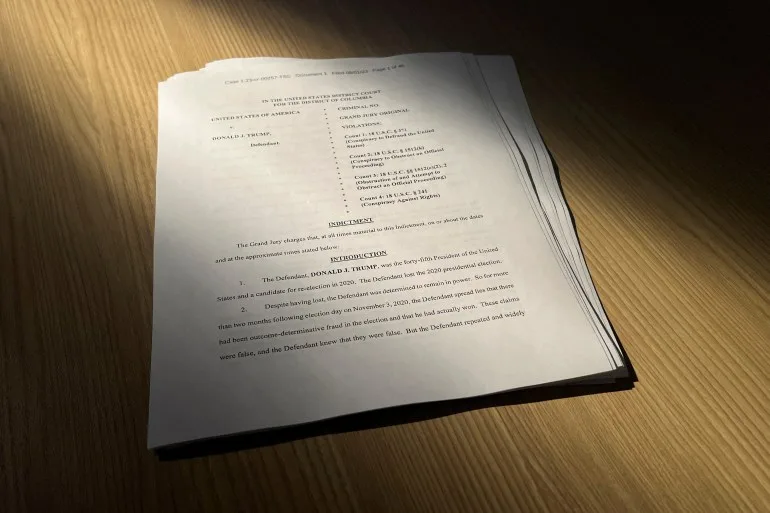
Congressional leaders respond to indictment
In the wake of the indictment, other prominent Republicans rallied to Trump’s side, including Speaker of the House of Representatives Kevin McCarthy, who insinuated the charges were political.
“Just yesterday a new poll showed President Trump is without a doubt Biden’s leading political opponent,” McCarthy wrote on social media.
McCarthy accused Biden of using a “two-tiered system of justice” to distract from his own political troubles — namely, the allegations of influence peddling that encircle his son, Hunter Biden.
Other Congressional Republicans floated the idea of defunding Special Counsel Smith’s office. Democrats, meanwhile, repeated their rallying cry that no political figure is too powerful to be above the law.
In a joint statement, Democratic leaders Hakeem Jeffries and Chuck Schumer invoked the consequences of the January 6 Capitol riot, which saw an estimate of seven people die in its aftermath.
“The third indictment of Mr. Trump illustrates in shocking detail that the violence of that day was the culmination of a months-long criminal plot led by the former president to defy democracy and overturn the will of the American people,” they wrote.
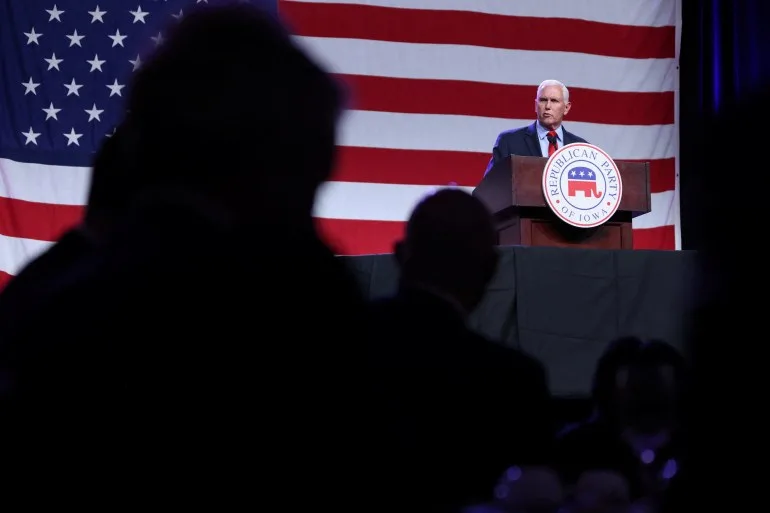
Republican candidates eye Trump’s lead
Trump’s closest rival for the Republican presidential nomination, Florida Governor Ron DeSantis, likewise issued a statement — but it avoided identifying the former president by name and did not offer an opinion on the indictment itself.
Rather, DeSantis offered a pitch for his own presidential campaign, echoing Republican criticisms of the Department of Justice and the Federal Bureau of Investigation (FBI), two entities involved in investigating Trump.
“As President, I will end the weaponization of government, replace the FBI Director, and ensure a single standard of justice for all Americans,” he wrote.
Another Republican presidential contender, Vivek Ramaswamy, vowed to pardon Trump if elected.
Former Vice President Pence, meanwhile, took another opportunity to distance himself from his former boss and current rival in the 2024 race. “Today’s indictment serves as an important reminder: Anyone who puts himself over the Constitution should never be President of the United States,” he said in a statement.
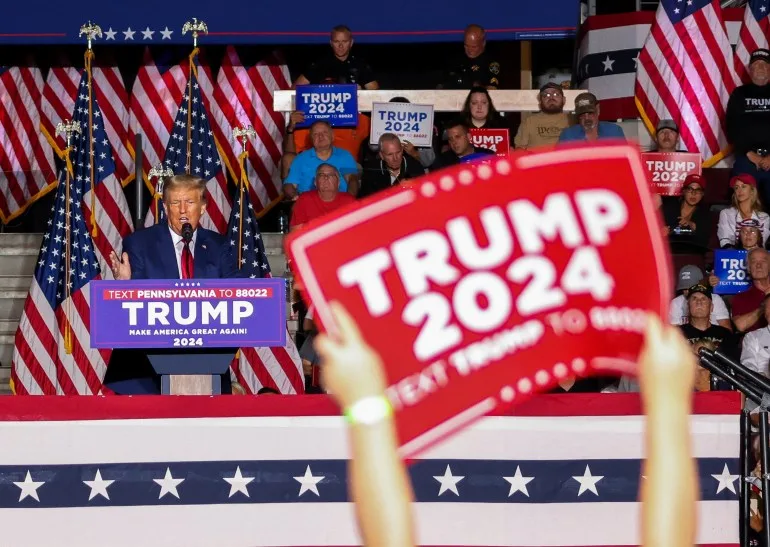
A leader in the 2024 Republican race
Public opinion survey have consistently shown Trump leading the crowded field for the 2024 Republican presidential nomination, with a New York Times/Siena College poll showing him 37 points ahead of DeSantis in the race.
That poll, released a day before the latest indictment, showed Trump with 54-percent support, trouncing DeSantis at 17.
If Trump manages to secure the Republican nomination, he is all but assured of a rematch with his 2020 opponent, President Biden. Criminal charges or a successful prosecution would not prevent Trump from continuing his campaign or being elected president.
Former federal prosecutor Melanie Sloan told Al Jazeera she believes the latest indictment will do little to dent Trump’s popularity among Republicans, though she emphasised the grave nature of the charges.
“Trump supporters are incredibly loyal, and they will come up with reasons why this is untrue, why this is unfair. Many of them still believe that, because former President Trump said it, that the election was in fact stolen,” Sloan said. “So they’ll just view this as part of the conspiracy.”
An array of legal jeopardy
Tuesday’s indictment is the latest legal woe in a litany of cases and investigations Trump already faces.
In April, he became the first US president, current or former, to face a criminal indictment when Manhattan District Attorney Alvin Bragg filed 34 state-level charges against him for falsifying business records.
That case pertained to a hush-money payment made to an adult film star during the 2016 presidential campaign.
Then, in June, Special Counsel Smith filed 37 federal charges alleging that Trump and his valet, Walt Nauta, attempted to retain and conceal classified documents at his Mar-a-Lago resort in Florida, despite requests to surrender them to the Federal Bureau of Investigation and the National Archives.
That indictment was expanded just last week with additional counts against Trump, bringing the total to 40. It also named an additional defendant in the classified documents case: property manager Carlos de Oliveira.
A grand jury in Georgia is also considering state-level charges in a similar investigation into 2020 election meddling. That probe was announced after an audio recording emerged of a phone call Trump made to Georgia Secretary of State Brad Raffensperger, wherein he pushed the election official to “find” him extra votes.
“There’s nothing wrong with saying that, you know, that you’ve recalculated,” Trump told Raffensperger during the call. That recording also factors into the indictment announced on Tuesday.
Prosecutor Fani Willis, meanwhile, has indicated she intends to announce any charges from the Georgia investigation before September 1.
Trump has denied wrongdoing in all of the cases against him.


